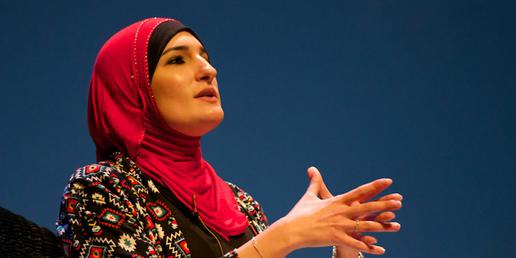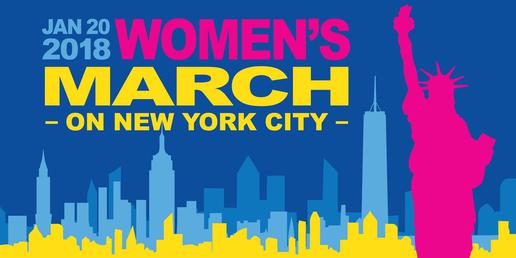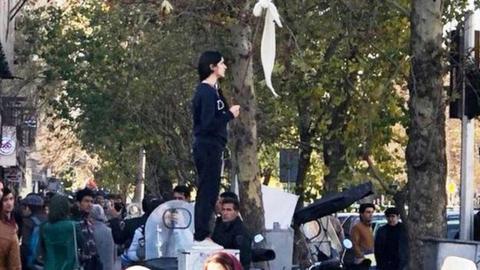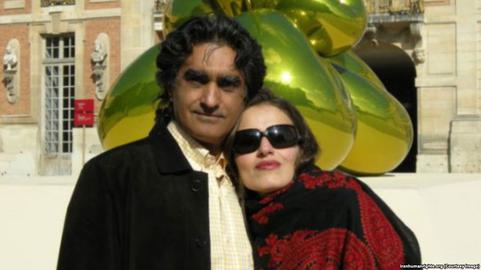Iran’s Twitter users are used to frequent raucous moments, watching the rise and fall of hashtags and witnessing as controversies quickly balloon. The recent uproar over a joint statement released by Iranian and American feminists is a case in point. It was published around the time of important events in both countries: The massive anti-Trump Women’s March in the United States on January 20, which took place in several cities across the US, and attracted at least 120,000 people, with some putting the figure at half a million; and the civic activism of an unnamed woman, who by taking a stand against Iran’s mandatory hijab laws became the face of the recent Iranian protests (even though her solo demonstration took place a few days prior to the large protests that took place across the country).
Sent out on January 16, the statement was signed by major feminist and academic figures in the US and those in the Iranian diaspora, including Iranian household names like the Nobel laureate Shirin Ebadi and Tehran-based lawyer Nasrin Sotoudeh. The Feminist Majority Foundation, Ms. Magazine and the Association for Middle East Women’s Studies’ Task Force for Human Rights were also among the signatories. Taking issue with right-wing US outlets that had attacked American feminists for being “embarrassingly silent on Iran protests,” while singing the praises of protests against the mandatory hijab, the statement said feminists in Iran and other Muslim-majority countries had to fight on two fronts — against the patriarchal rules of “the ruling clergy and extremist fundamentalists” but also “interventionist forces in the West who abuse the violation of women’s rights to further their own interests.”
Parts of the right-wing in the US had also attacked some of the hijab-wearing women who took part in the Women’s March, and compared their behavior with that of the Iranian women who took off their hijabs. But the statement from Iranian and American feminists said the movement in Iran was about defending “a woman’s right to wear or not wear hijab without being forced to do either by force or governmental pressure.” It stated categorically that a US Muslim hijab-wearing activist could be an ally of that hijab-less “brave Iranian woman” and that any attempt to divide them would work against “strengthening of the international solidarity and transnational relations of sisterhood in the struggle for equal rights.”
Not long after the statement was published online, it was clear that many Persian-language tweeters had one major issue with it. It had been signed by Linda Sarsour, the Brooklyn-born Muslim political activist and a co-chair of the 2017 Women’s March.
Some of the links to the statement also led to a statement in support of Sarsour, causing some confusion and drawing more attention to what some regarded as her dubious track record. Figures including Saeed Ghaseminejad, a fellow at the Foundation for Defense of Democracies — a think tank close to the Trump administration — started an online campaign against Sarsour, who Ghaseminejad called an “Islamist supporter of Hamas, sharia law and hijab.” Others drew attention to some of Sarsour’s controversial remarks in the past, including her defense of the possibilities of using sharia law. Others said their protest wasn’t about Sarsour per se. “Whether Sarsour had signed it or not, its content was nonsensical,” one tweet read.
Nayereh Tohidi, a signatory to the statement and professor at the Department of Gender & Women Studies, California State University, Northridge, said that some right-wing pro-Trump commentators “tried to divide and bash the feminists involved in the anti-Trump Women’s March by pitting Iranian anti-hijab protestors against American hijab-wearing women.” To illustrate and give an example of this, the statement sent out on January 16 included a link to a montage that juxtaposed Sarsour’s photograph with that of the Iranian woman who staged the first solo protest against compulsory hijab in Tehran’s Revolution (or Enghelab) Street. “To some, this very link implied an indirect support for Sarsour,” said Tohidi. “Some even wrongly assumed that we made that montage,” she added, pointing out that it was obvious that the alt-right pro-Trump author and commentator Jack Posobiec had created the image and tweeted it out to his 247,000 followers.
The online reaction led to one well-known signatory, New York-based journalist Masih Alinejad, withdrawing her name from the statement. At the same time, many others defended their actions. On January 26, a group of Iranian feminists issued a new statement explaining that Sarsour’s name had been added at the last minute and expressed frustration over how this had drew all the attention, deflecting from the main points of the statement.
In an interview with IranWire, US-based activist and scholar Mehrangiz Kar — who is well-known for her years of feminist activity in Iran — defended her decision to sign the statement and said she couldn’t join the “extremist feminists” who opposed not only the mandatory hijab but any form of Islamic veiling.
“For those of us who signed the statement, opposing mandatory hijab has nothing to do with insulting women who chose hijab based on their own decision,” Kar told IranWire. “The extremist feminists, whose opinion I respect but who need to be more mature, don’t believe there is such a thing as voluntary hijab. They say that everyone has accepted hijab by the force of their husband, brother or father.”
Publishing the statement had exposed “two diverging approaches” within the Iranian feminist community, Kar said.
Kar had to endure a lot of Twitter criticism — and abuse — after the statement was published. She said that she had thought of hijab-wearing women who visited her family when she was in prison or those who supported Nasrin Sotoudeh during her imprisonment. “My own mother chose hijab without being forced by her father or husband,” she added.
“How can I ask those fellow Iranians who voluntarily wear the hijab to take it off? I, for one, don’t like this method of activity for women’s rights,” Kar said. She said the Iranian regime had “created tension between hijab-less and hijab-wearing women” and that this should be countered by feminists, not “reproduced.”
Ghaseminejad's Attack on Signatory Nayereh Tohidi
Saeed Ghasseminejad also attacked signatory professor and women's rights advocate Nayereh Tohidi. He published a photograph of her sitting on a panel with Trita Parsi, an Iranian-born US scholar and founding president of the National Iranian American Council who is known for advocating Iran Deal, or the Joint Comprehensive Plan of Action (JCPOA). Critics accuse him of currying favor for Tehran.
But Tohidi points out that the photograph dates back 11 years, to an event at the University of California Los Angeles. She says Ghasseminejad misrepresented the photograph, giving a false impression of her relationship with Parsi. Instead of it being a photograph of a panel discussion, it actually just shows Tohidi taking part in an informal discussion following a lecture sponsored by the Center for Near Eastern Studies at UCLA. At the same time, she says she would take part in panel discussion with Parsi, despite the fact that she has been critical of the NIAC because of what she describes as the NIAC’s “lack of attention to violations of human rights in Iran.” But the photograph used by Ghasseminejad is not one of any formal discussion.
Speaking to IranWire, Tohidi defended her support of the statement and said the controversy around it had been raised by “Trumpists.” But she criticized Sarsour as someone who “doesn’t have a correct understanding of feminism, which is a modern phenomenon” and said she harbors “some extremist views.”
“I hope she [Sarsour] studies and maybe she changes, thinks differently and gets to an all-encompassing gender egalitarianism,” Tohidi told IranWire. Some of Sarsour’s ideas “contradict the principles of human rights and equality,” Tohidi said, before adding that she would be willing to debate her on those issues. She was happy to defend Muslim voices like that of the Moroccan feminist Fatima Mernissi, Tohidi added.
Some feminists tweeting in Persian voiced support for Sarsour too. Toronto-based Nazli Kamvari said Sarsour was a “woman who is struggling for the civil rights of a minority within a minority (Muslim women living in America)” and added: “Despite all problems you might have with Islam, this woman has done so much good.”
In another tweet, Kamvari wrote: “She married at 17, had three kids and was able to study, work and become a symbol of rights for Muslim women in America ... criticize her all you want but those of you who reject her come nowhere near her persistence and efforts.”
visit the accountability section
In this section of Iran Wire, you can contact the officials and launch your campaign for various problems



























comments